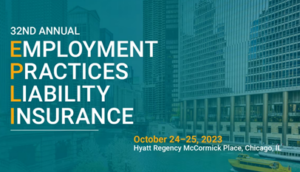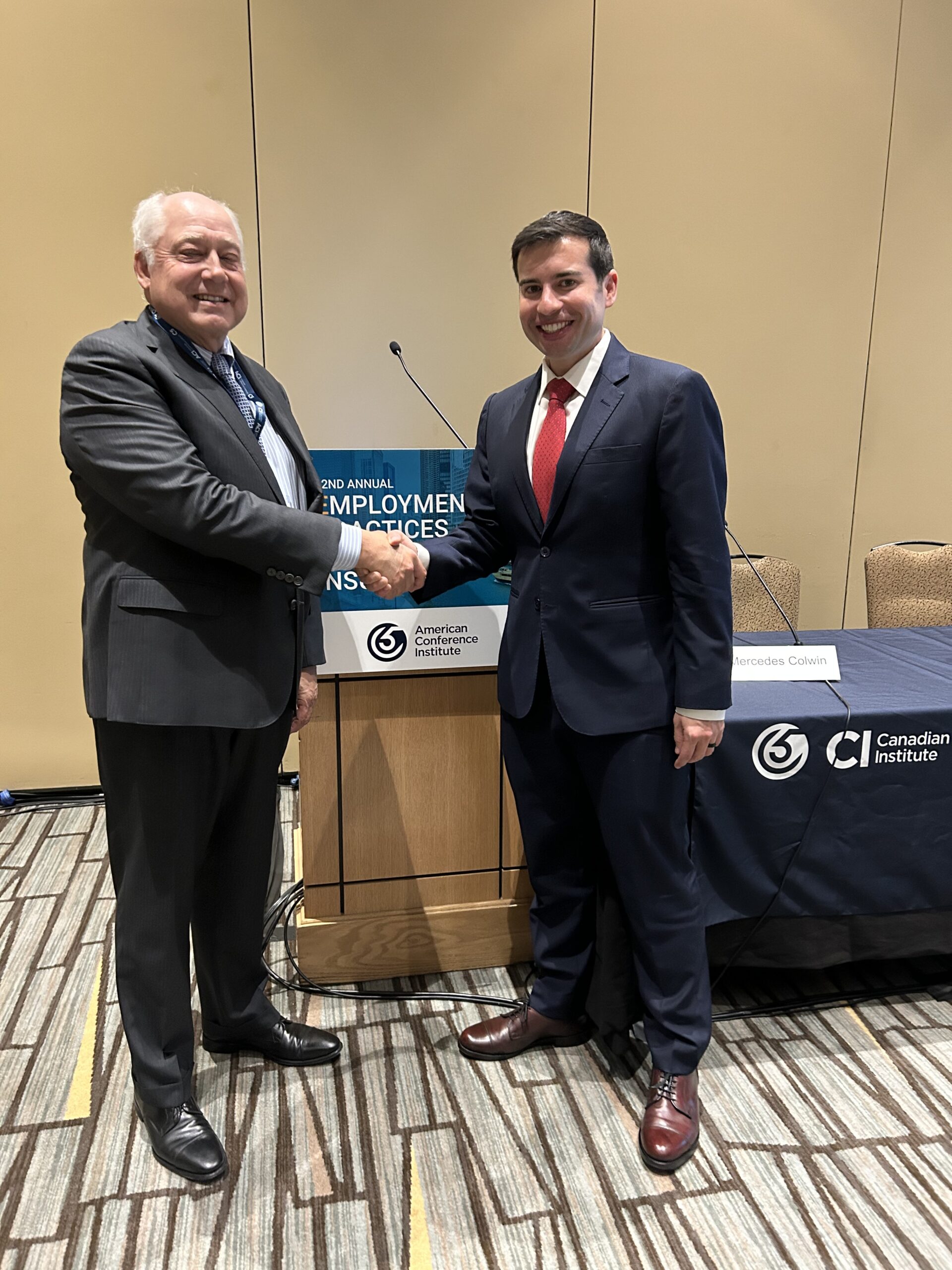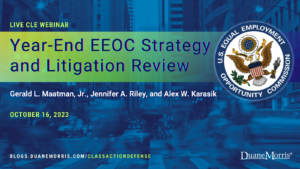 By Gerald L. Maatman, Jr.
By Gerald L. Maatman, Jr.
Duane Morris Takeaways: USA-based companies are experiencing a deluge of class action litigation. Part of the increase is related to ESG-related claims (“Environmental, Social, and Governance”) involving environmental justice, product advertising, employment and DEI, corporate social responsibility, and investment practices. At the National Conference on Class Actions 2023 by BLG and the Quebec Bar Association in Montreal, Jerry Maatman of the Duane Morris Class Action Defense Group provided commentary on the state of U.S. class action litigation and how Asian, European, and U.S.-based corporations should be “looking around the corner” to ready themselves for new class action theories advancing ESG-related claims..
The National Conference on Class Actions in Montreal – with a robust two day agenda and roster of speakers from Canada, Europe, and Asia – examined diverse issues on cutting-edge class actions on a global basis. Subjects included the phenomenon of the “continuous evolution” of class action theories; securities fraud class action theories; collective, opt-in and opt-out representative actions in Canada and Europe; cross-jurisdictional class actions; and the dawn of ESG class actions filed by NGO’s, consumers, workers, and advocacy groups.
I had the privilege of speaking in Montreal on the current state of U.S. class action litigation, its impact on the global economy and litigation in non-U.S. jurisdictions, and the future of ESG-related class-wide litigation in America.
The plaintiffs’ class action bar in the United States is exceedingly innovative and in constant pursuit of “the next big then” insofar as potential liability is concerned for acts and omissions of Corporate America. Environmental, Social, and Governance issues – known as “ESG” – each of the verticals within ESG are topics on the mind of leading plaintiffs’ class action litigators. As ESG-related issues evolve and become increasingly more important to corporate stakeholders, class action litigation against companies is inevitable and has already begun to take shape. Factors driving these class actions include the new “social inflation” concepts coming out to the COVID-19 pandemic, as well as social movements coalescing around climate change, technological disruptions, and social justice.
The Class Action Context
In 2022, the plaintiffs’ class action bar filed, litigated, and settled class actions at a breathtaking pace. The aggregate totals of the top ten class action settlements – in areas as diverse as mass torts, consumer fraud, antitrust, civil rights, securities fraud, privacy, and employment-related claims – reached the highest historical totals in the history of American jurisprudence. Class actions and government enforcement litigation spiked to over $63 billion in settlement totals. As analyzed in our Duane Morris Class Action Review, the totals included $50.32 billion for products liability and mass tort, $8.5 billion for consumer fraud, $3.7 billion for antitrust, $3.25 billion for securities fraud, and $1.3 billion for civil rights. While the exact totals are not in yet for 2023, aggregate settlement numbers are nearly as high over the past 11 months.
As “success begets success’ in this litigation space, the plaintiffs’ bar is focused on areas of opportunity for litigation targets. ESG-related areas are a prime area of risk.
The ESG Context
Corporate ESG programs is in a state of constant evolution. Early iterations were heavily focused on corporate social responsibility (or “CSR”), with companies sponsoring initiatives that were intended to benefit their communities. They entailed things like employee volunteering, youth training, and charitable contributions as well as internal programs like recycling and employee affinity groups. These efforts were not particularly controversial.
In recent years, ESG programs have become more extensive and more deeply integrated with companies’ core business strategies, including strategies for avoiding risks, such as those presented by employment discrimination claims, the impacts of climate change, supply chain accountability, and cybersecurity and privacy. Companies and studies have increasingly framed ESG programs as contributing to shareholder value.
As ESG programs become larger and more integrated into a company’s business, so do the risks of attracting attention from regulators and private litigants.
Class Actions Are Coming From Multiple Quarters
While class action litigation can emanate from many sources, four areas in particular are of importance in the ESG space.
Shareholders: Lawsuits by shareholders regarding ESG matters are accelerating. Examples include claims that their stock holdings have lost value as a result of false disclosures about issues like sexual harassment allegations involving key executives, cybersecurity incidents, or environmental disasters. Even absent a stock drop, some shareholders have brought successful derivative suits focused on ESG issues. Of recent note, employees of corporations incorporated in Delaware who serve in officer roles may be sued for breach of the duty of oversight in the particular area over which they have responsibility, including oversight over workplace harassment policies. In its ruling in In Re McDonald’s Corp. Stockholder Derivative Litigation, No. 2021-CV-324 (Del. Ch. Jan. 25, 2023), the Delaware Court of Chancery determined that like directors, officers are subject to oversight claims. The ruling expands the scope of the rule established in the case of In Re Caremark International Inc. Derivative Litigation, 698 A.2d 959 (Del. Ch. 1996), which recognized the duty of oversight for directors. The decision will likely result in a flurry of litigation activity by the plaintiffs’ bar, as new cases will be filed alleging that officers in corporations who were responsible for overseeing human resource functions can be held liable for failing to properly oversee investigations of workplace misconduct such as sexual harassment.
Vendors and Business Partners: As companies face increasing demands to address ESG issues in their operations and throughout their supply chains, ESG requirements in commercial contracts are increasing in prevalence. Requirements imposed on vendors, suppliers, and partners – to ensure their operations do not introduce ESG risks (e.g., by using forced or child labor or employing unsustainable environmental practices) are becoming regular staples in a commercial context. In addition, as more companies report greenhouse gas emissions – and may soon be required by the SEC to report on them – they increasingly require companies in their supply chain to provide information about their own emissions. Furthermore, if the SEC’s proposed cybersecurity disclosure rules are enacted, companies also may require increased reporting regarding cybersecurity from vendors and others. These actions – and disclosures – provide fodder for “greenwashing” claims, where consumers claim that company statements about environmental or social aspects of their products are false and misleading. The theories in these class actions are expanding by encompassing allegations involving product statements as well as a company’s general statements about its commitment to sustainability.
State Consumer Protection and Employment Laws: The patchwork quilt of state laws create myriad causes of action for alleged false product advertising and other misleading marketing statements. The plaintiffs’ bar also has invoked statutes like the Trafficking Victims Protection Reauthorization Act to bring claims against companies for alleged failures to stop alleged human rights violations in their supply chains. These claims typically allege that the existence of company policies and programs aimed at helping end human rights violations are themselves a basis for liability. In making human capital management disclosures a part of ESG efforts (including whether to disclose numeric metrics or targets based on race or gender), companies may find themselves in a difficult place with respect to potential liability stemming from stated commitments to diversity and inclusion. On the one hand, companies that fail to achieve numeric targets they articulate (e.g., a certain percent or increase in diversity among management) may subject themselves to claims of having overpromised when discussing their future plans. Conversely, employers that achieve such targets may face “reverse discrimination” claims alleging that they abandoned race-based or gender-neutral employment practices to hit numbers set forth in their public statements.
Government Enforcement Litigation: Federal, state and local government regulators have taken multiple actions against companies based on their alleged participation in climate change, investments inconsistent with ESG goals, or alleged illegal activities. For instance, in 2019, the U.S. Department of Justice investigated auto companies for possible antitrust violations for agreeing with California to adopt emissions standards more restrictive than those established by federal law. While the investigation did not reveal wrongdoing, it underscores the creativity that proponents and opponents of ESG efforts can employ.
Implications For Corporate Decision-Makers
The creation, content, and implementation of ESG programs carries increasing litigation risks for corporations but it is unlikely that ESG programs will diminish is size or scale in the coming years given increased focus by Fortune 100s and 500s and increased regulation at the federal and state levels.
Sound planning, comprehensive legal compliance, and systematic auditing of ESG programs should be a key focus and process of all entities beginning or continuing their ESG journey. As more and more companies adopt some level of corporative ESG strategy planning, compliance and auditing are some of the key imperatives in this new world of exposure to diminish and limit one’s exposure.
 By Gerald L. Maatman, Jr. and Christian J. Palacios
By Gerald L. Maatman, Jr. and Christian J. Palacios










